Share Your Resources
The aim of this area within the Toolkit is to support staff across Scottish schools and local authorities who are looking for information and resources on literacy difficulties, dyslexia and inclusive practice.
A great deal of time is used recreating resources and ‘reinventing of the wheel’. To reduce this workload issue, the Toolkit is available to share appropriate copyright free resources.
If you able to help and have created any case studies materials, resources to support dyslexia or can share copyright free resources please email the toolkit working group:
toolkit@dyslexiascotland.org.uk
Films
Films
A large range of international films about dyslexia are freely available on the internet. They are set within different educational contexts, policies, legislation and approaches which do not always reflect the inclusive Scottish educational context of Curriculum for Excellence and collaborative assessment for dyslexia. However, they can support professional reflection and self-evaluation.
Below a small selection has been highlighted.
A film of Sir Jackie Stewart, President of Dyslexia Scotland, speaking at the re-launch of the Addressing Dyslexia Toolkit 8th March 2017, can be viewed here. To view all films from the 2017 and 2010 launches, click here.
1. Cathy Magee and Fran Foreman introduce this series of 7 Professional learning films about the Making Sense Dyslexia and Inclusive Practice Programme. This first film provides an overview introduction to a series of professional learning films developed by members of the Addressing Dyslexia Toolkit working group as well as practitioners who received their GTCS Professional Recognition Awards in Dyslexia and inclusive practice in January 2020 from the Deputy First Minister. The films were made possible with the support of the Scottish Government and are aimed at specialist teachers and probationer mentors who wish to deepen their own knowledge in dyslexia and inclusive practice and to train others in their areas. View the film.
2. Vivien Moorhouse shares her experience of doing Module 1: Dyslexia and Inclusive Practice - reflecting on what motivated her, the learning outcomes, experience of doing the module and the impact on practice, learners, families and colleagues. View the film.
3. Fran Foreman outlines Module 2: Supporting dyslexia, inclusive practice and literacy – including the background to its development, the learning outcomes and impact on practice. View the film.
4. Liz O’Donoghue shares her experience of doing the Module 3: Dyslexia: Identification and Support - reflecting on what motivated her, the learning outcomes, experience of doing the module and the impact on practice, learners, families and colleagues. View the film.
5. Susan Miller reflects on her experience of undertaking the national Dyslexia and inclusive practice Professional Recognition pilot and the focus areas of her Practitioner Enquiry and the outcomes achieved. View the film.
6. Louise Elder reflects on her experience of undertaking the national Dyslexia and inclusive practice Professional Recognition pilot, the focus areas of her Practitioner Enquiry, ‘Using Technology in Writing’ and the outcomes achieved. View the film.
7. Catherine Roger and Debbie Thomson reflect on how the Dyslexia and Inclusive practice implementation resource was used in East Ayrshire, including their motivation for using it and the impact on practice in their local authority. View the film.
Dyslexia Explained: What's It Like Being Dyslexic?
Running time: 07:15mins
An animated film created by the company ‘Nessy’ highlighting the negative impact arising from unidentified dyslexia and how things can improve. Please note that this film is not set within the Scottish context of curriculum for excellence and collaborative assessment however it provides useful information to support professional reflection.
Hidden Potential
Running time: 11:07mins
‘Hidden Potential’ a new short film on dyslexia to mark Dyslexia Awareness Month (October 2016) made by Eamonn McMahon, with some support from the Dyslexia Association of Ireland.
The True Gifts of a Dyslexic Mind - Dean Bragonier - TEDx Talks
Running time: 16:51mins
Dean Bragonier offers a different take on Dyslexia. By looking at the unique mindset of Dyslexics as a strength, Dean reframes a perceived weakness as a powerful tool and teaches us all an important lesson about the power of an open mind. This talk links to the entitlement of an accessible curriculum for learners who are dyslexic in Scotland and the support and information provided to Scottish teachers from CALL Scotland.
https://www.youtube.com/watch?v=_dPyzFFcG7A
Dystalk
Dystalk is a website designed for parents in England but may be of help to Scottish practitioners. The website provides short videos featuring talks on a range of topics by leading academics.
http://www.dystalk.com/
Further Information and References
The previous versions of the Addressing Dyslexia Toolkit contained a wealth of important and detailed guidance for teachers and local authorities. Where it has not been possible to incorporate the information into the new website, an archive of useful information and references is available on request.
Films and Launch Presentations
The filmed presentations will be useful for anyone wishing to find out more about the toolkit – including some of the reasons why the toolkit is important and what Education Scotland (HMIE)’s expectations are from schools in supporting learners with additional support needs.
These film clips can easily be incorporated into professional development sessions in schools and local authorities about the toolkit, as well as used by individual teachers and parents.
Films
A film of Sir Jackie Stewart, President of Dyslexia Scotland, speaking at the re-launch of the Addressing Dyslexia Toolkit 8th March 2017 can be viewed here.
Films from 2010 launch
The first version of this toolkit, the ‘Assessing Dyslexia’ toolkit was officially launched at Moray House School of Education, the University of Edinburgh on 1st June 2010 by Dyslexia Scotland’s President, Sir Jackie Stewart and Mike Russell, Cabinet Secretary for Education and Lifelong Learning.
We have retained three of the five presentations from the original launch as these are still relevant. Click on the links below to see them.
Sir Jackie Stewart, ‘Unidentified Dyslexia’ 2010.
June Orr, HMIe, Developments since the 2008 HMIE review, 'Education for learners with dyslexia'
Sitemap (Visual)
[INSERT SITEMAP IMAGE]
General Teaching Council for Scotland - GTCS
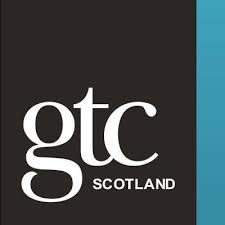
The General Teaching Council for Scotland -
Enhancing Professionalism in Education scince 1965
This toolkit will help you as a teacher to enhance and evidence your professional practice in relation to dyslexia and inclusion.
The Scottish teaching profession is committed to career-long professional learning (CLPL).
Having attained the Standard for Full Registration, teachers will continue to develop their expertise and experience across all areas of their professional practice through appropriate and sustained career-long professional learning.
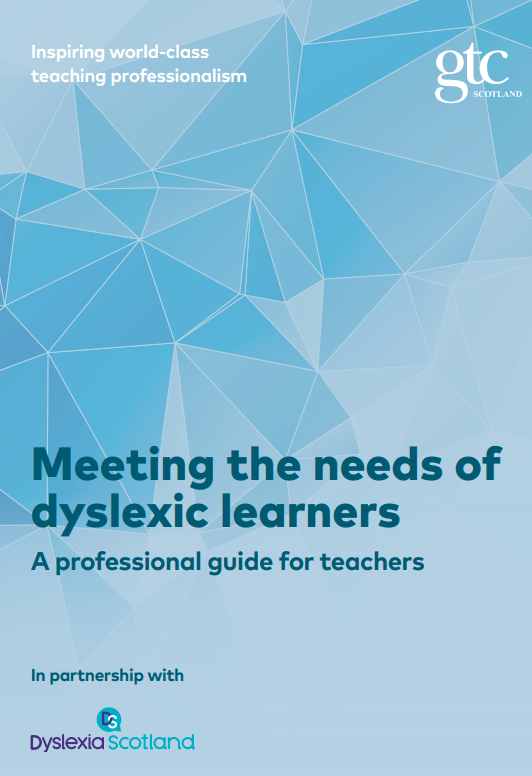
Cathy Magee, Chief Executive, Dyslexia Scotland said,
“Dyslexia Scotland welcomes the publication of these new practical professional guides on additional support needs, including on dyslexia. They are useful ‘go to’ resources which we hope all teachers will regularly refer to in order to understand and meet the needs of all learners in their classroom. The Dyslexia Guide includes the Scottish definition, addressing dyslexia in the Scottish context, the broad range of characteristics of dyslexia and what can help, as well as links to a wide selection of useful additional resources for further learning.”
Ken Muir, Chief Executive and Registrar at GTC Scotland said,
“In the last 10 years we have seen a near six-fold increase of children and young people with a recorded additional support need in our schools.
During this time, GTC Scotland has embarked on a number of projects to help registrants enhance their skills and capacity to support children and young people with additional support needs, the latest of which is the publication of professional guides on autism, neurodiversity and dyslexia.
The professional guides are deliberately short and easy to read, with very practical guidance that encourages reflection with advice that can be readily adopted into teaching practice. They also complement the increased focus given to additional support needs in the revised Professional Standards for teachers, which become mandatory in August 2021.”
The Standard for Career-Long Professional Learning describes the advanced professional knowledge and pedagogical expertise that registered teachers will develop and maintain as they continue to progress in teaching and the education profession. The standard provides an opportunity for teachers to progress, enrich, develop and enhance their practice, expertise, knowledge, skills and professional values.
Click this link to access a film.
The standards are underpinned by the themes of values, sustainability and leadership. Professional values are at the core of the Standard for Career-Long Professional Learning. They are integral to, and demonstrated through, all of our professional relationships and practices.
The online learning modules for dyslexia and inclusive practice and CLPL Routemap have been developed around the following areas which the GTC identifies as CLPL:
- Pedagogy, learning and subject knowledge
- Curriculum and assessment
- Enquiry and research
- Educational contexts and current debates in policy, education and practice
- Sustaining and developing professional learning
- Learning for sustainability
Information about the nature and purposes of CLPL can be found in the 2012 GTCS publication via this link.
Professional values are at the core of the Professional Standards.
The Professional Values and Personal Commitment core to being a teacher are:
- Social Justice
- Integrity
- Trust and Respect
- Professional Commitment
All of the above are intrinsically linked to supporting all learners within an inclusive curriculum
Learning Opportunities and Resources
Dyslexia and Inclusive Practice: Professional Learning Resource
Improving Practice and Empowering Whole School Approaches to Support Learners
A reflective and evaluative professional learning approach to improve practice and empower whole school approaches to support learners
This professional learning resource has been developed by Education Scotland, the Making Sense Working Group and stakeholders to support practitioners, schools and local authorities to.
- improve the quality of educational outcomes for learners with dyslexia through collaborative enquiry and effective self-evaluation
- evidence the impact of the collaborative enquiry through evidenced based improvements
- fulfil statutory duties
- support professional learning on Inclusive practice
- further develop inclusive practice for all learners within the school community
- build on partnerships within the Regional Improvement Collaboratives (RICs), developing opportunities to share practice and reduce duplication of resource development.
The level of awareness and readiness for change will vary across schools and local authorities and this resource can be used to focus on specific areas for improvement to contribute to whole school inclusive practice.
The Dyslexia and Inclusive Practice: Professional Learning Resource has been developed to support all five recommendations from the Making Sense report. However, there is a focus on Recommendation 4 and in particular 4.4.
Below are some further suggestions of professional learning opportunities and resources. Click on the tabs for further information.
This free professional resource has been developed in response to the 2014 Education Scotland Review Making Sense Dyslexia: Education for Children and Young People with Dyslexia in Scotland which recommended that:
Education Scotland should work with Dyslexia Scotland and other relevant stakeholders to develop a comprehensive dyslexia professional learning package which can be used by local authorities to increase the capacity of teachers to meet learning needs.
This resource has been updated in 2020
Winner of the prestigious ELTons 2014 award for Excellence in course innovation
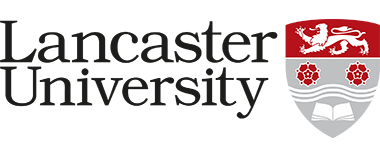
The DysTEFL materials comprise a whole course suitable not only for teachers of English as a foreign language, but also for anyone involved in language teaching. The materials can be used for self-study or to raise awareness of the learning needs of those with dyslexia when learning another language. The materials are suitable for pre- and in-service teachers as well as training institutions. There is a wide repertoire of useful teaching methods, techniques and tools in this package.
Supporting Bilingualism and EAL
This online learning opportunity has been developed in partnership with Education Scotland, Glasgow City Council and SCLIT (Scotland's National Centre for Languages). Click here for this free online module.
Teachers of foreign languages will find a range of useful information to help with language learning and inclusion in the foreign language classroom. Click here to visit Languages without Limits.
Professional development resource for staff in nursery and primary schools (every primary school in Scotland should have received a copy of this). Contact us for a PDF of the Count Me In pack, on toolkit@dyslexiascotland.org.uk.
Dyslexia at Transition is a Scottish Government funded, Dyslexia Scotland managed DVD. Designed by the University of Edinburgh, the DVD supports primary and secondary schools in their understanding of dyslexia and in their support of learners, especially at the transition stage from primary to secondary.
A copy was given to every primary and secondary school in Scotland.
Any schools wishing to order another copy of this DVD should contact: info@dyslexiascotland.org.uk
Fran Foreman (Ranaldi) and Paul Nisbet (CALL Scotland) have produced guidance on producing accessible text to ensure that children and young people with dyslexia gain appropriate access. See the resource to the left hand side of this page.
CALL Scotland won an award at the inaugural 'AAC Awards' Ceremony held at the University of Leeds on Friday 11th October 2019. These National awards were organised by Communication Matters, the UK wide organisation for Augmentative and Alternative Communication (AAC).
Representatives from CALL Scotland and the Scottish Book Trust attended the ceremony, along with Bookbug of course, and collected the 'Outstanding Community Inclusion' Award for their Bookbug symbolised resources and accessible digital versions of the Bookbug Family Bag books, which are gifted to every Primary 1 child in Scotland for National Book Week in November each year. For more details, visit the link below:
https://www.callscotland.org.uk/blog/call-scotland-scottish-book-trust-partnership-win-aac-award/
Packs of booklets on Supporting Pupils with Dyslexia in the Early Years and at Primary School have gone to every primary school in Scotland. Further details and information are available from Dyslexia Scotland's South East branch and the material can also be downloaded from Dyslexia Scotland's main website by Dyslexia Scotland members. For membership information see Dyslexia Scotland's website.
Packs of booklets for all subject teachers and a CD ROM have gone into every secondary school in Scotland. Further copies can be downloaded from the Dyslexia Scotland website. As for the Primary School packs, membership is requested.
This set of slides may help in a consideration of what is meant by literacy and how pupils can be supported in their literacy development. It should be noted that the strategies suggested work well for all pupils.
Reflective Reading
To view 'Dyspraxia, visual stress, and foreign language learning from a student's perspective' click here.
Suggested Reading on Neurodiversity
Free Online Learning Modules
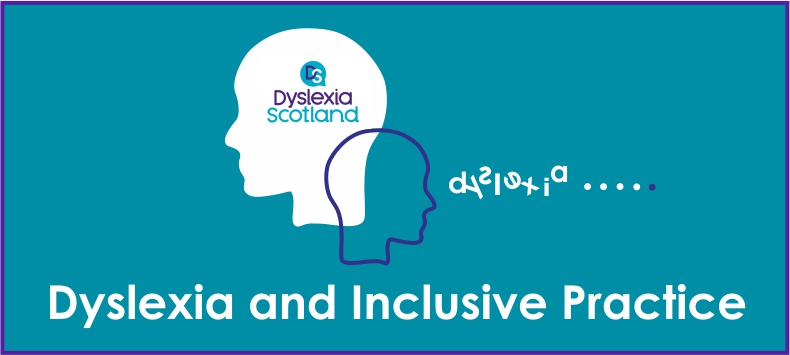
Free Open University Online Learning Modules
Three free online learning modules, which support GTC Scotland Professional Standards, Professional Update and Professional Recognition, have been developed in response to Recommendations 1 and 2 of the 2014 Education Scotland Review: Making Sense of Dyslexia: Education for Children and Young People with Dyslexia in Scotland. The modules are primarily for teachers, school management and GTCS registered local authority education officers. The modules are:
- Module 1: ‘Introduction to Dyslexia and Inclusive Practice’
- Module 2: 'Supporting Dyslexia, Inclusive Practice and Literacy'
- Module 3: 'Dyslexia: Identification and Support'
All of the modules need to be completed in order - you cannot go straight to module 2 or 3 without doing the previous one. Please note that you need to log into OpenLearn Create before you start the modules. These modules were refreshed in April 2021 to reflect feedback from teachers who have completed the modules from 2018 - 2021. They now incorporate GTCS's 2021 Professional Standards.
Click here to access Module 1 'Introduction to Dyslexia and Inclusive Practice'
Click here to access Module 2 'Supporting Dyslexia, Inclusive Practice and Literacy'
Click here to access Module 3 'Dyslexia: Identification and Support'
The modules have been developed to complement the 2015 Education Scotland Route Map for Dyslexia and Inclusive Practice. They were written by the Making Sense Working Group and supported by the Opening Educational Practices Scotland Project hosted at the Open University in Scotland.
The modules are hosted on the Open University OpenLearn Create platform. Mozilla Open Badges will be available for those completing the modules.
Dyslexia and inclusive practice GTCS Professional Recognition programme
We are delighted that Dyslexia Scotland was awarded unconditional accreditation to deliver a GTCS Professional Recognition programme in ‘Dyslexia and Inclusive Practice’. Accreditation is for five years from May 2021.
The programme will develop accomplished expert teachers in dyslexia and inclusive practice, who will be well equipped to support learners and colleagues through the holistic identification and support process for dyslexia in Scotland. The programme will be delivered in close collaboration with Education Scotland and the Addressing Dyslexia Toolkit working group.
The first programme started in September 2021 and will last an academic year. There will be another opportunity for teachers to apply next year.
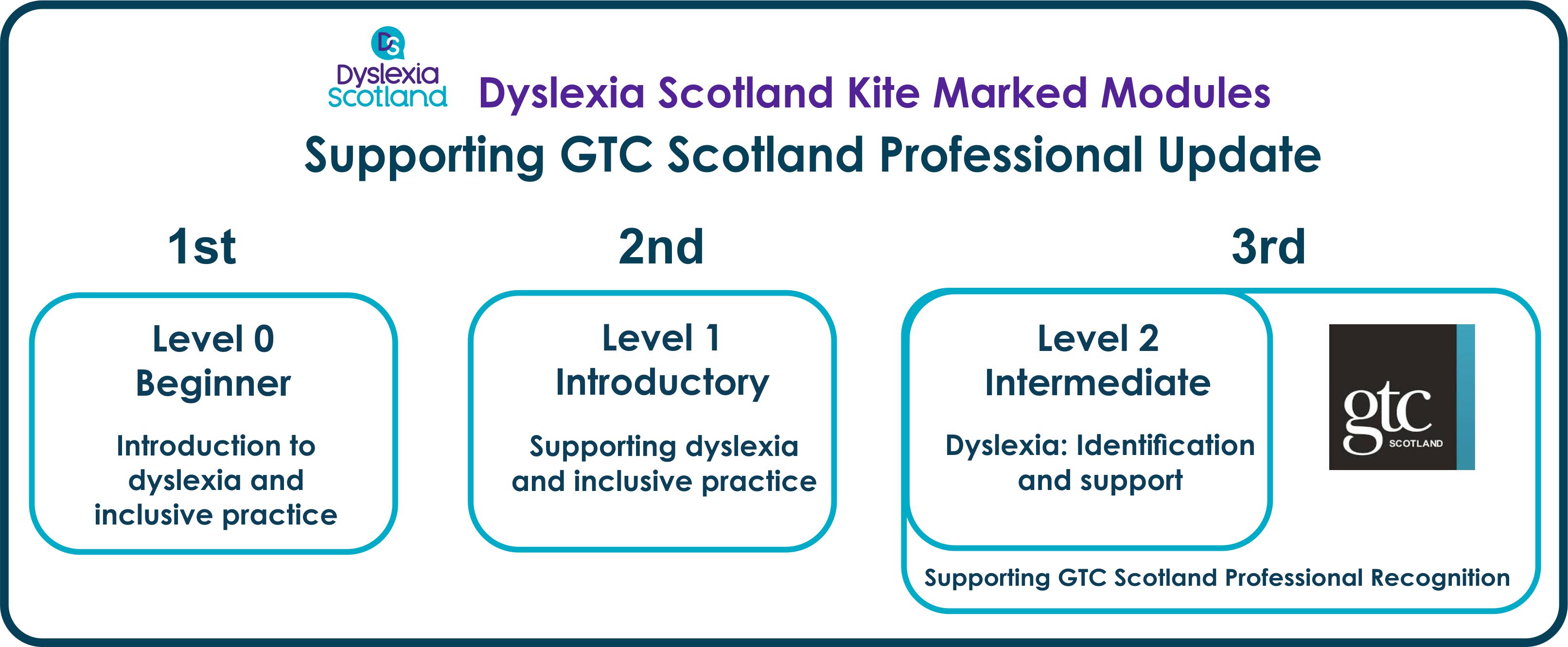
This short course is designed to provide an introduction for teachers, community educators and anyone with an interest in developing positive approaches to supporting dyslexia in their inclusive practice. This resource links to the General Council for Scotland’s Professional Standards.
This module will support a deeper understanding of dyslexia and inclusion. Module 2 has been designed to provide practitioners with a deeper understanding of:
- Dyslexia and inclusive practice within the Scottish context of education, equality and equity
- Dyslexia and how it is identified
- Dyslexia, co-occurring additional support needs and inclusive practice
- Effective communication
- Support strategies
This module is for specialist support teachers.
Module 3 has been designed to provide practitioners with a deeper understanding and experience of:
- Holistic and collaborative identification of dyslexia using the Pathway within the Addressing Dyslexia Toolkit.
- Appropriate support and assessment within the Scottish context
- Enabling school communities to improve the outcomes of learners with dyslexia and associated difficulties
- Supporting school communities to improve inclusive practice
- Developing learner profiles to support post school transition
Professional Recognition Practitioner Enquiry Topics
Ten practitioners were awarded the Dyslexia and inclusive practice Professional Recognition Awards in January 2020 following the two-year pilot programme delivered in collaboration with Dyslexia Scotland, Education Scotland, the Scottish Government and GTCS.
These are the topics that the successful awardees researched as part of their practitioner enquiry:
- Understanding Dyslexia, with a focus on the identification process
- Reducing potential barriers to learning, providing appropriate resources and strategies to ensure dyslexic pupils feel included so that their achievement and attainment success follows.
- Exploring the use of Peer Support at transition to Secondary School to improve the Health and Wellbeing of dyslexic learners
- The holistic assessment and identification of Dyslexia: A new process of least intrusive, holistic assessment using a team around the child approach
- How young people with dyslexia can be more effectively encouraged to become confident digital learners.
- The introduction of a whole school visual approach to support the auditory processing needs of pupils.
- Leadership of improvement in dyslexia and inclusive practice. Adopting a whole school approach to improvement, through implementation of inclusive pedagogies and practices to enhance pupils learning and raise attainment.
- Supporting teacher learning in the field of identifying dyslexia within an inclusive practice model and the Dyslexia Identification Pathway (Addressing Dyslexia Toolkit) which offers a way to shape the existing process into a cohesive, holistic, and collaborative school-wide system
- Does training staff to understand the complexities of dyslexia help them to feel better equipped to help, to feel valued and to understand the pupil better? Does training the support staff also help to target support more specifically and ultimately benefit the pupil(s) in the classroom environment by providing an inclusive ethos?
- Helping learners with dyslexia build confidence and strategies to progress in the world with digital supports.
Introduction to Dyslexia and Inclusive Practice Module - CLD, Post School
This introductory module aims to provide practitioners who work in a CLD setting (post school) with an improved awareness of what dyslexia is, its impact, how it is assessed in different contexts and how it can be supported within an inclusive learning environment.
It is anticipated that the module will take between 2 - 3 hours to complete, depending on prior knowledge and the depth of learning undertaken.
The module has been developed and written by a collaborative partnership between Education Scotland, Dyslexia Scotland and the CLD Standards Council Scotland with support from the Specific Learning Difficulties Forum.
www.open.edu/openlearncreate/dyslexia-inclusive-practice-CLD
Aims of all four modules:
- To inform practitioners about ways in which they might engage in meaningful career-long professional learning in order to improve outcomes for children, young people and adults
- Provide free and accessible opportunities to engage with professional learning
- To support deeper learning and understanding of dyslexia and inclusive practice
- Provide opportunities for participants to reflect on their practice regarding dyslexia and inclusion
- To encourage all teachers to be familiar with, and make appropriate use of, the Addressing Dyslexia Toolkit and to encourage those working with adults to be aware of the range of resources available
- To support teachers in achieving professional recognition for areas of enhanced accomplishment in their professional practice and to support those working with adults in their continuing professional development
Education Scotland has a suite of free online learning modules which support GTC Scotland Professional Standards, Professional Update and Professional Recognition. These have been developed to support inclusive education. The modules are primarily for teachers, school management and GTCS registered local authority education officers.
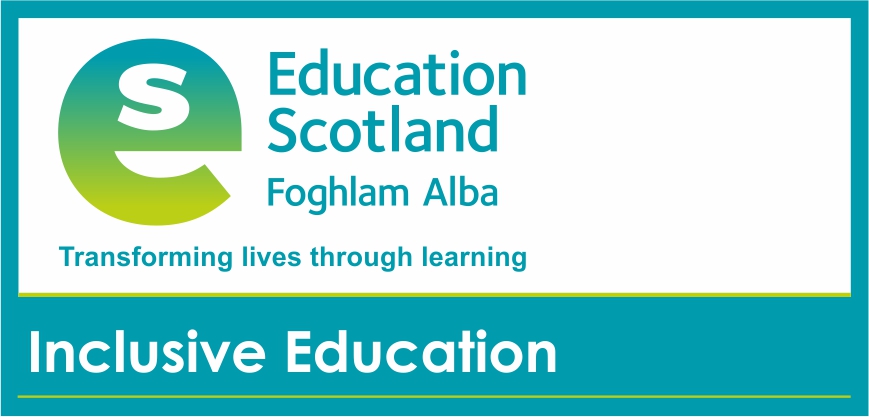
This module provides educational practitioners and local authorities with an introduction to inclusion and equality set within the context of Scottish education. The module and activities will support practitioners to develop an:
- Understanding of the education context in Scotland of inclusion and equality
- Awareness of additional support needs and inclusion
- Awareness of how to deliver child centred approaches within the Scottish legislative framework
- Awareness of universal and targeted support
- Awareness of information and approaches which support inclusive education.
This module been also designed to support teachers meet the GTCS standards for Professional Learning, annual reviews and Professional Update.
Further information and a link to the module can be found on the National Improvement Hub page.
This module provides educational practitioners in secondary schools and local authorities. It is based on The CIRCLE Framework, a collaboration between practitioners in Edinburgh City Council, Queen Margaret University and NHS Lothian, that has been adapted for modular learning by Education Scotland.
It offers practical advice on how to meet the needs of individual learners and supports practitioners to develop collaborative approaches and share good practice.
After studying this module practitioners will have:
- An understanding of how to promote effective inclusive practice using the CIRCLE Framework of inclusion
- An awareness of how to promote a learner centred approach where learners are listened to and involved in the management of their own learning
- An awareness of documentation to evidence assessment and input.
Further information and a link to the module can be found on the National Improvement Hub page.
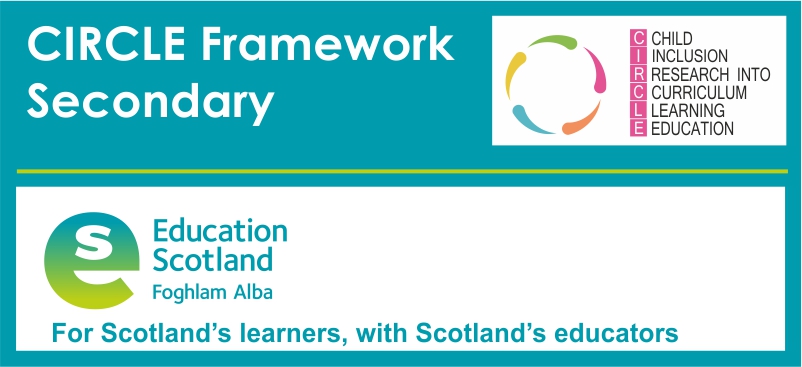
Introduction to Autism and Inclusive Education.
Inclusion in Practice: The CIRCLE Framework – Primary
Please see Learning Opportunities and Resources for further suggestions of professional development materials and resources.
Post School
Post School Transition
The transition from secondary school to post school can be daunting for young people with dyslexia and their families. In cases where dyslexia is a significant additional support need, transition planning must begin no later than 12 months before they leave school and it is often the case that transition support begins earlier as highlighted in the 2017 Code of Practice (3rd edition).
The Scottish Government aims to ensure that all young people have a positive destination and a range of professionals work with schools to support this.
It is very important that the assessment information gathered by staff in school over the years is given to the young person and they understand the value of the report so they can use this when discussing their support needs in post school situations.
Post School Identification and Support
The criteria involved in providing a post school identification of dyslexia is different from a young person who is attending school in Scotland, therefore it is important that the information gathered at school is made available to the young person before leaving.
Post school Independent Assessments are carried out by practitioners who hold specific qualifications which are not required for teachers in Scottish schools. Independent assessors usually charge for this service.
Employers are not obliged to help with the cost of an assessment but often recognise the benefits an assessment can have for the company and their employee. Support in the workplace is available through the Access to Work programme, arranged through the Job Centre.
Students in Further or higher education
Colleges and Universities have a duty under the UK wide Equality Act 2010 to make ‘reasonable adjustments’, to ensure that students with disabilities are not placed at a disadvantage in comparison to non-disabled students.
This is an anticipatory duty which means that education providers should continually review and anticipate the general needs of disabled people, rather than simply waiting until an individual requests a particular adjustment.
Students might also be able to apply for the Disabled Students’ Allowance (DSA), through Student Award Agency Scotland (SAAS). An assessment is required to access the grant funding. The assessment has to meet a set of criteria and must be carried out by appropriately qualified practitioners - Educational Psychologists or dyslexia specialists.
An Independent Assessment is not required prior to course entry at college or university, particularly if an appropriate assessment has been carried out in school by a qualified individual. If an assessment has been carried out in school, and updated around the age of 16, then some Universities will accept that as proof of dyslexia without the need for any independent, paying assessment. If an assessment is not in place prior to the start of the course this can lead to a delay in support and assessment arrangements being in place.
In summary the entitlement to assessment and identification of dyslexia differs between school and post school due to the different systems which have been developed for different settings and age groups. It is advisable to contact the college or university in advance to find out what their procedures are.
Introduction to Dyslexia and Inclusive Practice Module
This introductory module aims to provide practitioners who work in a CLD setting (post school) with an improved awareness of what dyslexia is, its impact, how it is assessed in different contexts and how it can be supported within an inclusive learning environment.
It is anticipated that the module will take between 2 - 3 hours to complete, depending on prior knowledge and the depth of learning undertaken.
The module has been developed and written by a collaborative partnership between Education Scotland, Dyslexia Scotland and the CLD Standards Council Scotland with support from the Specific Learning Difficulties Forum.
Please click the link below to access this course on the Open University website. It is available to anyone to complete and is free of charge.
www.open.edu/openlearncreate/dyslexia-inclusive-practice-CLD
